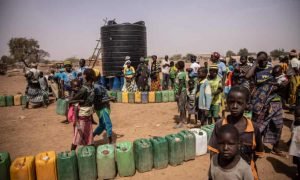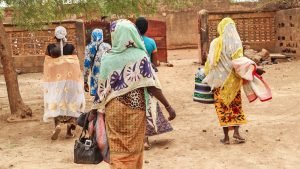Burkina Faso has been suffering from attacks by jihadist groups affiliated with Islamic State and al-Qaida since 2015. Burkina Faso has been hard hit by these attacks as a poor country in the arid sub-Saharan Sahel region. Recently, 80 people including 59 civilians were killed in an attack in the north of the country.
The attack took place near the town of Gorgadi and left six pro-government militiamen and 15 military policemen dead. The death toll was confirmed by the government. The government officials were in the area to guard civilians setting off for Arbinda, another town in northern Burkina. According to the government, 58 ‘terrorists’ were killed in the violence that followed.

This was one of the most recent major attacks in the region. Another occurred on 4th August 2021 near the Niger border which killed 30 people, including 11 civilians. On August 9, 12 soldiers were killed in attacks by suspected jihadists in northern Burkina Faso, bordering Niger. On 4th and 5th June, gunmen killed at least 132 people in the northeast village of Solhan, including children too. This was Burkina’s deadliest attack in the history of insurgency.
Attacks and raids became frequent in the region following al-Qaida emerging here in 2012. They are concentrated mostly in the north and east, near the borders of Mali and Niger. Gorgadji is located in these three border zone. This is a part of the larger violence faced by the Sahel region.

The crisis in Burkina Faso is majorly credited to the rise of several Islamist groups, homegrown and from different regions in Africa. Ansaroul Islam was founded by a Fulani preacher named Boureima Dicko, who began preaching in 2009. He tapped into the long time grievances of his fellow Fulani who believed they were neglected by the country’s central government. Another group is the Jama’at Nusrat al Islam wal Muslimin, which translates to the Group to Support Islam and Muslims. This group has many smaller fringes, one of which is affiliated with Al Qaeda. It mostly operates in the north and east of Burkina Faso. Two other Islamic Extremist groups are the Islamic State in the Greater Sahara and the Islamic State in West Africa Province. Many of these groups follow opposite philosophies which add to the violence in the region.

The International Rescue Committee has referred to the crisis in Burkina Faso as “the world’s fastest-growing displacement crisis”. The violence has created hoards of internally displaced people struggling to survive in their homeland. As the region plummets into an economic crisis, the IDPs are exploited. Community leaders have been demanding sex or money in return for food aid. One local official says that these are the ‘tip of the iceberg’. One woman, who prefers to stay anonymous, has said that she has been staying in state-sponsored shelters for the last six months. She does not get food till she has sex with the people distributing food. Many women have also contracted sexual diseases because of this. These women do not wish to talk about this as they don’t want to risk losing food. An inter non-profit system to prevent and address sexual abuse is being set up.
